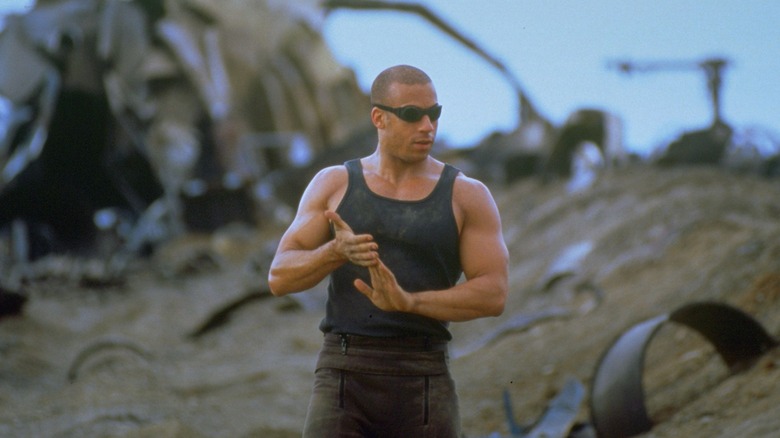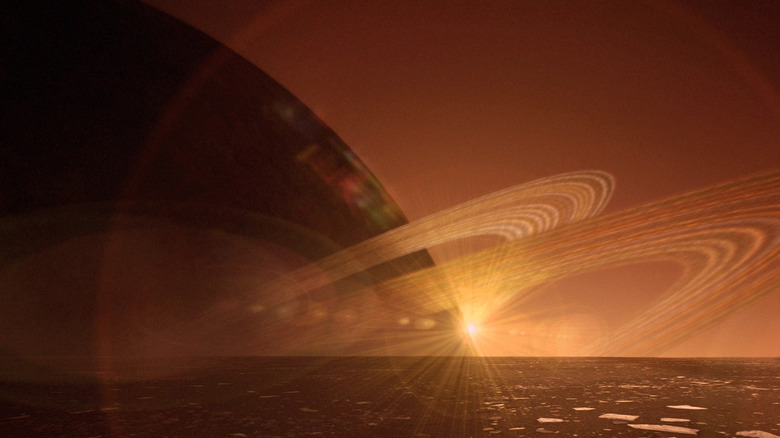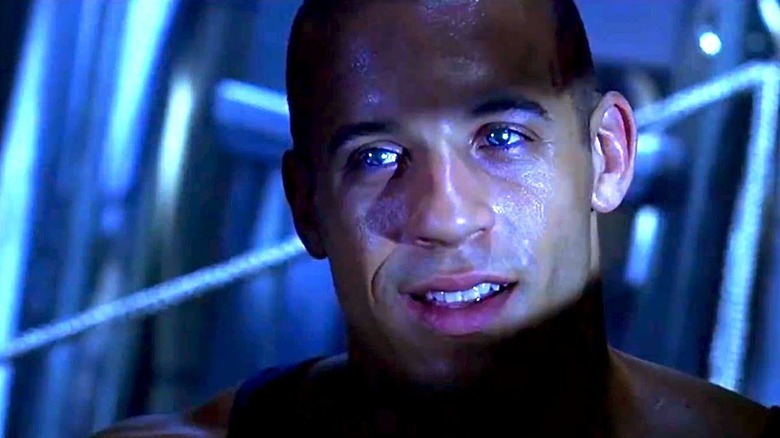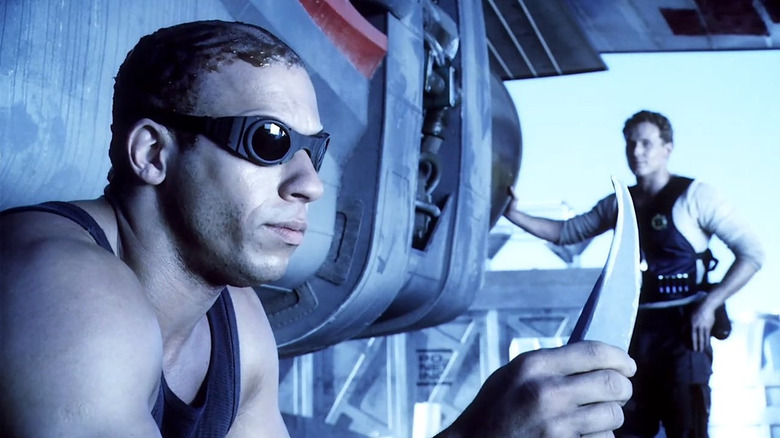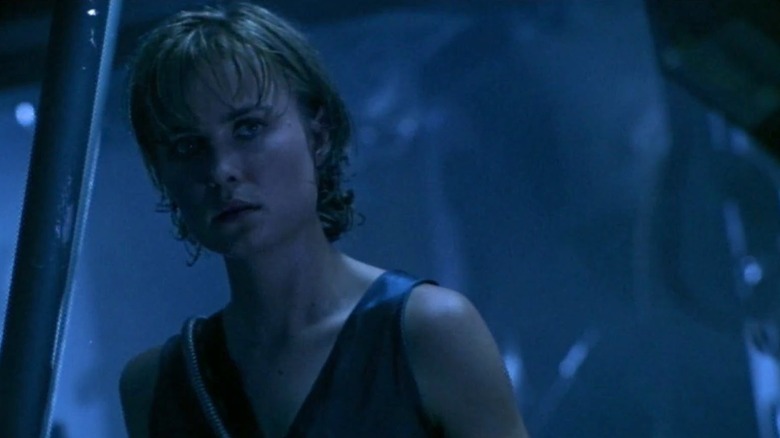Pitch Black Ending Explained: Rejoining The Human Race
When "Alien 3" was released in 1992, it was roundly bashed by critics, met with uproar by fans, and later disowned by its director, David Fincher. Despite this, the troubled production and intrigue around Fincher's original vision have made it a constant source of fascination for "Alien" aficionados. One of the many subplots was the input of David Twohy, one of several writers involved in the film and whose biggest contribution was the setting of a prison planet populated by shaven-headed criminals.
Things didn't work out for Twohy on "Alien 3," but he got a chance to revisit that idea when he was offered the chance to rework and direct a screenplay that bore similarities to the "Alien" movies. Its most interesting character would become a vicious criminal named Richard B. Riddick, recaptured after busting out from a maximum security prison, perhaps not unlike the one in the much-maligned third film in the original "Alien" trilogy.
"Pitch Black" was a sleeper hit that became a minor cult classic, a no-nonsense B-movie with a high-concept hook that introduced Vin Diesel to a wider audience and set his career on an action-packed trajectory. It was successful enough to start its own franchise built around Riddick, although that fell foul of the law of diminishing returns. Like Steven Spielberg's famous shark, Riddick was more of a threat when kept in the shadows; front-and-center of a "Dune" lite space opera like "The Chronicles of Riddick," he was just a standard badass in a tank top.
Although the special effects are dated, "Pitch Black" is still a taut and suspenseful sci-fi thriller that wraps up all its story threads in a satisfying finale. Let's take a look at why the whole thing pays off so effectively.
The set up
"Pitch Black" opens in interstellar space as a merchant ship ferrying passengers in cryosleep runs into trouble. The hull is ruptured by micro-meteorites, killing the captain and sending the craft hurtling into the atmosphere of a nearby planet. Docking pilot Carolyn Fry (Radha Mitchell) takes the controls and tries to jettison her human cargo to save herself, only prevented by a system failure.
The ship crash-lands on the sun-bleached exoplanet, killing most of the passengers and First Officer Owens (Simon Burke), leaving Fry as captain of the few survivors. Among the awoken sleepers are Richard B. Riddick (Vin Diesel), a hardened criminal and murderer being escorted back to prison by bounty hunter Johns (Cole Hauser), a morphine addict pretending to be a cop; Imam al-Walid (Keith David), a Muslim escorting three boys to New Mecca; Jack (Rhiana Griffith), a teen girl masquerading as a boy; and Paris Ogilvie (Lewis Fitz-Gerald), a snobby antique dealer.
Riddick makes his escape and stalks the survivors as they investigate their surroundings. They find an abandoned research station, which handily has a dropship and a solar-powered truck. The planet basks in the perpetual light of three suns but a rare celestial event is about to take place: An eclipse will plunge it into darkness, allowing a hive of voracious photosensitive predators to leave their subterranean caverns and hunt on the surface once again.
Their only hope is to retrieve power cells for the dropship from the crash site, but Johns dallies, not wanting to give Riddick a chance to escape. As a vast ringed planet blocks out the sunlight, the truck loses power, leaving the survivors to run the gauntlet back to the dropship on foot as the hungry creatures pick them off one by one.
Dark secrets
"Pitch Black" plays on the horror convention that we are safe in broad daylight, and the fact that the planet harbors a nasty secret lurking underground waiting for the dark is a theme neatly mirrored by the motivations of the characters. Originally driven by self-preservation, Fry cuts a determined figure as she marshals the survivors, who are unaware that she was prepared to sacrifice them all to save her own butt. She confides in Johns, overheard by Riddick, and the fake cop is ready to use this information against her at a critical moment. He is posing as a straight-shooting law enforcer, but he is only out for himself; he held out on Owens as he was dying when his morphine supply could have eased his pain, and later suggests a callous way of keeping the creatures away from the bulk of the survivors.
Riddick starts out as the villain of the piece but, perhaps unknown even to himself, he still has a heroic streak buried deep within. Lastly, there is Jack, who unwittingly endangers the party as they slog through the darkness because her menstrual blood is drawing the creatures to them.
All these secrets come out in the finale as the survivors pick their way through a creature-infested canyon. Johns reveals his true nature by suggesting that Riddick kills the girl so they can use her as bait to draw the winged predators away from the rest. That option might have proven the path of least resistance for our anti-hero, but his conscience is pricked and he fights Johns instead, leaving him bleeding in the dark for the creatures to feast on while he and the others hurry on their way.
Fry wins over Riddick
With their light sources dwindling, Riddick hides the remaining survivors — the Imam, Jack, and Fry — in a cave while he drags the power cells to the dropship. Once he gets there, he prepares to blast off and leave the others behind. Fry catches up with him, and the captain and the killer make a bid for each other's souls.
Fry implores Riddick to go back with her, appealing to whatever human feeling might still reside beneath his hardened exterior: "There's got to be some part of you that wants to rejoin the human race." Riddick has a counter-offer that leaves her torn between duty and the selfish instinct that made her try to sacrifice the passengers in the first place. He suggests that she save herself by going along with him instead.
Fry's better nature wins over and she says she would rather die than abandon Jack and the Imam. Her bravery persuades Riddick, and they return to the cave. "Never had a doubt," Jack says with delight. She idolizes the criminal and shaved her head to mimic his look, and now her hero has returned.
"Pitch Black" tips its hand too early with the characterizations, leaving us with little doubt either. Johns is obviously shifty from the start, so it is little surprise when he turns out to be the real villain. Conversely, we're just waiting for Riddick's change of heart; David Twohy has revealed that the criminal originally had a smaller part, but test audiences reacted positively to him and the director put more emphasis on Vin Diesel's character in the final cut. Less Riddick might have made him a more ambiguous figure but, while Diesel does a great job of giving him a sense of unpredictable menace, it's only a matter of time before he leaps to the rescue.
A final sacrifice
On the way back to the dropship, Riddick is separated from the others and left facing off against two of the creatures. He is wounded and cries out, prompting Fry to head back and save him. "I said I'd die for them, not you," she says, but she speaks too soon. She is impaled by one of the monsters and dragged away into the darkness.
I'm a little divided on this ending for Fry. On one hand, her initial attempt to kill dozens of people in their sleep to save herself is an almost irredeemable dereliction of duty, so her death is a natural way to complete her arc. On the other, it seems like she might have shown enough courage and heroism to earn her salvation by the end of the film.
Either way, her brave decision to go back for a murderer like Riddick helps him complete his transition from anti-hero to hero. He admires her gutsiness and determination, and he is deeply moved that she ends up sacrificing herself for a lowly criminal like himself. As he and the last two survivors take off to safety, Jack worries that they might get picked up by mercenaries and Riddick could face prison again. "Tell them Riddick's dead. He died somewhere on that planet."
Earlier in the movie, Johns suggested using this excuse while bargaining with Riddick to help them escape the planet. The line also has an obvious double meaning: After their terrifying adventure and Fry's death, Riddick's worst nihilistic impulses indeed died on the planet and he is now ready to rejoin the human race.
